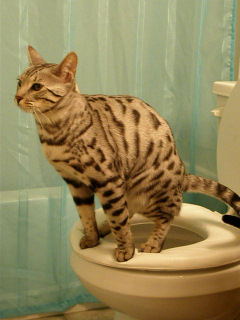Reasons You Shouldn't Flush Cat Poop Down Your Toilet - Preserve Your Plumbing System
Reasons You Shouldn't Flush Cat Poop Down Your Toilet - Preserve Your Plumbing System
Blog Article
This great article below relating to How to Dispose of Cat Poop and Litter Without Plastic Bags is indeed motivating. Don't miss it.

Introduction
As pet cat proprietors, it's essential to be mindful of exactly how we get rid of our feline close friends' waste. While it may seem convenient to flush feline poop down the bathroom, this technique can have destructive consequences for both the atmosphere and human health.
Environmental Impact
Flushing pet cat poop introduces hazardous microorganisms and parasites into the water, posing a considerable danger to aquatic ecological communities. These pollutants can negatively influence marine life and concession water top quality.
Health Risks
Along with ecological concerns, flushing pet cat waste can also position wellness risks to people. Cat feces might consist of Toxoplasma gondii, a parasite that can trigger toxoplasmosis-- a potentially serious disease, particularly for pregnant women and individuals with damaged immune systems.
Alternatives to Flushing
Luckily, there are safer and a lot more liable ways to dispose of cat poop. Consider the complying with alternatives:
1. Scoop and Dispose in Trash
The most common approach of throwing away pet cat poop is to scoop it right into a biodegradable bag and toss it in the trash. Be sure to utilize a devoted litter scoop and deal with the waste quickly.
2. Use Biodegradable Litter
Opt for naturally degradable pet cat trash made from materials such as corn or wheat. These litters are environmentally friendly and can be safely gotten rid of in the trash.
3. Bury in the Yard
If you have a lawn, think about hiding pet cat waste in a designated area away from veggie gardens and water sources. Make certain to dig deep adequate to avoid contamination of groundwater.
4. Mount a Pet Waste Disposal System
Purchase a pet waste disposal system specifically developed for feline waste. These systems utilize enzymes to break down the waste, lowering odor and ecological impact.
Conclusion
Responsible family pet ownership expands past providing food and shelter-- it likewise includes correct waste monitoring. By refraining from purging feline poop down the toilet and choosing alternative disposal methods, we can lessen our environmental impact and safeguard human health.
Why You Should Never Flush Cat Poop Down the Toilet
A rose by any other name might smell as sweet, but not all poop is created equal. Toilets, and our sewage systems, are designed for human excrement, not animal waste. It might seem like it couldn’t hurt to toss cat feces into the loo, but it’s not a good idea to flush cat poop in the toilet.
First and foremost, assuming your cat uses a litter box, any waste is going to have litter on it. And even the smallest amount of litter can wreak havoc on plumbing.
Over time, small amounts build up, filling up your septic system. Most litter sold today is clumping; it is made from a type of clay that hardens when it gets wet. Ever tried to scrape old clumps from the bottom of a litter box? You know just how cement-hard it can get!
Now imagine just a small clump of that stuck in your pipes. A simple de-clogger like Drano isn’t going to cut it. And that means it’s going to cost you big time to fix it.
Parasitic Contamination
Believe it or not, your healthy kitty may be harboring a nasty parasite. Only cats excrete Toxoplasma in their feces. Yet it rarely causes serious health issues in the cats that are infected. Most people will be fine too if infected. Only pregnant women and people with compromised immune systems are at risk. (If you’ve ever heard how women who are expecting are excused from litter cleaning duty, Toxoplasma is why.)
But other animals may have a problem if infected with the parasite. And human water treatment systems aren’t designed to handle it. As a result, the systems don’t remove the parasite before discharging wastewater into local waterways. Fish, shellfish, and other marine life — otters in particular — are susceptible to toxoplasma. If exposed, most will end up with brain damage and many will die.
Depending on the species of fish, they may end up on someone’s fish hook and, ultimately on someone’s dinner plate. If that someone has a chronic illness, they’re at risk.
Skip the Toilet Training
We know there are folks out there who like to toilet train their cats. And we give them props, it takes a lot of work. But thanks to the toxoplasma, it’s not a good idea.

We hope you enjoyed our article on How to Dispose of Cat Poop and Litter Without Plastic Bags. Thanks so much for spending some time to read through our article post. Sharing is caring. Helping others is fun. We love reading our article about How to Dispose of Cat Poop and Litter Without Plastic Bags.
Call Today Report this page